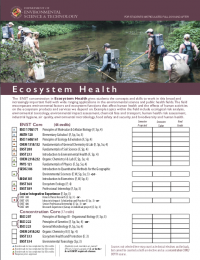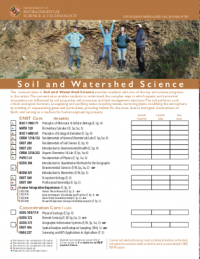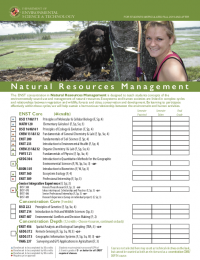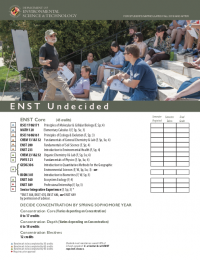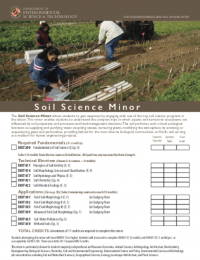Advising Each Semester
The ENST Department has mandatory advising for all of its students at least once each semester.
New student? Review our ENST Orientation: Incoming Students
Please contact your advisor (or Dr. Shannon P Browne at shannon3@umd.edu if you don't know who your advisor is) to arrange an appointment time and come prepared with the following:
-
Curriculum sheet checked off
-
ENST's Student Questionnaire filled out
-
Unofficial transcripts printed out from Testudo
This will help ensure your advising appointment will be efficient and allow you additional time to discuss your current semester, future semester, and future career goals.
Advising
Students should schedule their advising meeting 2-7 business days prior to their Testudo registration date.
Prior to their advising meeting, students must update their ENST advising documents and upload them to ELMS (elms.umd.edu > courses > all courses > ENST Advising > Assignments) in order for their registration block to be lifted.
ENST students who need assistance with their advising forms or have general questions can meet with ENST Peer Advisor Cecilia Bowers prior to their advising meeting. Cecilia is available in the Peer Mentor Office, 0107 Symons Hall. The Peer Mentors' schedule and other information is available on the AGNR site.
AGNR also has a peer mentor dedicated to study abroad opportunities - Bridget Harris. If you are thinking about studying abroad during your time at UMD, Bridget can help you find the best program for you. Whether just curious about options or ready to start planning, Bridget can offer guidance on program selection, the application process, scholarships, and everything in between. She is available in Symons Hall, Room 0106, on Mondays & Tuesdays 3:30-6:00pm, or you can reach out to her through email: harrisb9@terpmail.umd.edu.
Additional Resources:
-
UMD Registrar
Know important academic deadlines like the last day to add or drop a class, when to apply for graduation, etc. -
Testudo
Students can add/drop classes, check waitlisted classes, review schedule, review bill, see transcripts, and use the GPA calculator -
ENST Advising Blog
Stay updated on advising information and opportunities such as internships, jobs, scholarships, and events -
Handshake
Career counseling to get help with applying for internships or jobs, access UMD's huge database of internships and jobs, and apply directly -
College of Agriculture and Natural Resources
Students can find out about AGNR scholarships, financial aid, clubs, and so much more -
ENST Undergraduate FAQs
Review additional information on ENST's FAQs page
Ecological Technology Design
The ENST concentration in Ecological Technology Design prepares students for integrating natural systems with the built environment to solve environmental problems while achieving economic, ecological and social sustainability. The science and applications of using natural systems, processes and organisms to address environmental issues has evolved during the last few decades to a mature level whereby there are strong employment opportunities for graduates that are cross-educated in ecology and technology.
Ecosystem Health
The ENST concentration in Ecosystem Health (previously Environmental Health) gives students the concepts and skills to work in this broad and increasingly important field with wide ranging applications in the environmental science and public health fields. The field encompasses environmental factors and ecosystem functions that affect human health and the effects of human activities on the ecosystem products and services we depend on. Example topics within the field include ecological risk analysis, environmental toxicology, environmental impact assessment, chemical fate and transport, human health risk assessment, industrial hygiene, air quality, environmental microbiology, food safety and security, biodiversity and human health, and children’s environmental health.
Soil and Watershed Science
The concentration in Soil and Watershed Science provides students with one of the top soil science programs in the nation. The concentration enables students to understand the complex ways in which aquatic and terrestrial ecosystems are influenced by soil properties and processes and land management decisions. The soil performs such critical ecological functions as supplying and purifying water, recycling wastes, nurturing plants, modifying the atmosphere by emitting or sequestering gases and particulates, providing habitat for the most diverse biological communities on Earth, and serving as a medium for human engineering projects.
Soil & Watershed Science Curriculum
Natural Resources Management
The ENST concentration in Natural Resources Management is designed to teach students concepts of the environmentally sound use and management of natural resources. Ecosystems and human societies are linked in complex cycles and relationships between vegetation and wildlife, forests and cities, conservation and development. By learning to participate effectively within these cycles, we will help sustain a harmonious relationship between the environment and human activities.
Natural Resource Management Curriculum
Undecided Concentration
For ENST students who are unsure of their concentration, these Undecided Curriculum sheets are designed to guide students through broad ENST Core classes with the goal of deciding a concentration by their third semester of classes.
Soil Science Minor
The Soil Science Minor allows students to gain expertise by engaging with one of the top soil science programs in the nation. This minor enables students to understand the complex ways in which aquatic and terrestrial ecosystems are influenced by soil properties and processes and land management decisions.
Academic Plans are now managed through the college and can be found under the Environmental Science and Technology accordion.
All ENST students are required to complete one internship before graduating, so order to graduate ENST students must complete ENST 389: Professional Internship.
All ENST students are expected to complete one Senior Integrative Experience (SIE) before graduating.
Students have several options to fulfill their SIE requirement tailored to your goals and future plans. These capstone options are by-permission-only, so you need approval from your ENST advisor to register. Review the SIE page for more information.
Overview
The College of Agriculture and Natural Resources Honors Program is intended to provide academically talented students with the opportunity for significant professional development through pursuit of a scholarly investigation under the guidance of a faculty adviser and to provide recognition of that development through the college honors citation. The scholarly investigation should go beyond the scope of the regular curriculum.
Eligibility
-
The student must be enrolled as a College of Agriculture and Natural Resources major.
-
The student must have completed at least 56 credits (junior standing) and must have completed at least 12 credits in their major.
-
The student must have a cumulative grade point average of at least 3.2 and a minimum gpa of 3.2 in courses required in the major.
Requirements
-
Six or more credits in upper-level honors courses, seminars, or workshops. These courses may be from any department on campus and may also be used to meet other requirements such as CORE Advanced Studies if approved as such. Graduate courses in the department (600-level), may substitute for any part of this requirement.
-
Six or more credits of DEPARTMENTAL 388 Honors Thesis Research under the direction of a faculty member, culminating in a thesis and satisfactory performance on an oral defense of the thesis conducted by two or more faculty members. Following a successful defense the student needs to file appropriate forms available from the College of Agriculture and Natural Resources Academic Programs Office.
Apply
Students interested in entering the AGNR College Honors Program should contact Associate Dean for Academic Programs of the College of Agriculture and Natural Resources, Dr. Joe Sullivan. Admission will be based on grades, background and work experience as well as evidence of the motivation and maturity necessary for the successful completion of the program. Admission will also be contingent upon the availability of a faculty advisor.
Benefits
All students enrolled in departmental honors are members of the University Honors Program and as such, may register for Honors courses and seminars offered through the program. Other benefits include eligibility for Honors scholarships, Honors housing, and participation in all Honors student activities and organizations.

